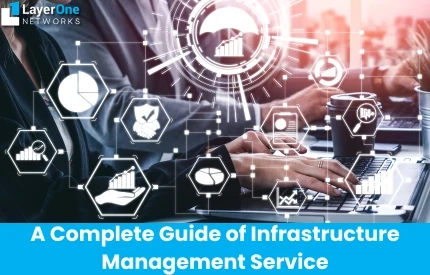Today, IT consulting firms provide a wide range of services to assist organizations in managing their IT infrastructure effectively. One such service is Infrastructure Management, which involves the planning, designing, implementing, and maintaining of an organization's IT infrastructure. Infrastructure Management Services ensure the smooth functioning of an organization's critical IT infrastructure and help optimize its performance, reliability, and security.
IT consulting firms specializing in Infrastructure Management Services employ experts in various areas such as network management, data center management, cloud computing, security management, and disaster recovery. These experts apply their experience to help firms create and put into practice IT infrastructure strategies that support their strategic objectives and provide measurable advantages.
Proper infrastructure management involves maximizing uptime for hardware such as computers, servers, or any other equipment or software that is crucial to the operation of your business. This guide will discuss what falls under the category of IT infrastructure management and some best practices to adopt for your company or organization.
What is Infrastructure Management Service (IMS)
Infrastructure Management Service is an essential business function organizations can outsource to manage their IT infrastructure. The primary objective of IMS is to ensure the smooth and efficient functioning of an organization's IT systems by reducing problems and maximizing productivity.
IMS comprises various service components that work together to achieve the goal of efficient infrastructure management. These service elements include help desk support, database administration, network monitoring and management, and system administration. The IMS team can perform routine maintenance activities and provide round-the-clock support for server or desktop issues.
Types of Infrastructure Management
IT consulting firms offer a range of Infrastructure Management Services (IMS) that can be customized to meet the unique requirements of different organizations. The following are some of the common types of IMS offered by IT consulting firms:
1. Network Management
Network management services are provided by IT consulting businesses to make sure a company's network is accessible, dependable, and secure. These services cover monitoring, optimization, troubleshooting, security management, network design, and implementation. Moreover, network administration entails maintaining network uptime and scanning the network for malicious users or potential issues.
2. Storage Management
There will always be a need to keep the information, regardless of the kind of business or organization you are running. Any information, whether it comes from the company's internal systems or clients, must be kept as secure as possible. The biggest problem with expanding is that the more information you store, the more malicious parties and hackers want it.
3. Security Management
Aside from risk assessment, security design, implementation, monitoring, and compliance management are services that IT consulting firms provide for security management. These services ensure the protection of an organization's IT system and data from online threats.
4. Systems Management
A system is something your business uses to boost output or carry out a task more effectively. Systems management covers maintaining specific programs that are required for access by your staff members. System management is another example of an office building's security.
5. IT Asset Management
IT consulting companies offer IT asset management services, such as inventory management for hardware and software, license management, and procurement management. These services guarantee that an organization's IT assets are effectively managed, optimized, and aligned with its corporate objectives.
Key Infrastructure Focus Areas
The management and upkeep of an organization's IT infrastructure depend heavily on IT support services. The following are some key infrastructure focus areas where IT support services plays a significant role:
1. Software
The software manages everything, from advanced design programs and employee scheduling to business communications systems. The ability of various departments to use the software as intended when necessary, even though multiple departments may perform these tasks, depends on competent IT infrastructure management. Software development is not included in IT infrastructure management and must also be considered.
2. Hardware
Hardware includes each tangible component of technology used in your company. Hardware in your company could include computers, servers, and security cameras. This equipment must operate at peak efficiency daily for your business to succeed. IT departments within organizations regularly handle equipment belonging to customers or staff. However, a help desk or tier 1 support department would often be the first to respond to hardware difficulties. IT infrastructure can aid with hardware support.
3. Company Network
Your business's users, computers, smartphones, customer accounts, and other operational components are part of your firm's network. Your business's network connects all of its parts; thus, maintaining it is just as crucial as maintaining any other element of your IT system. Network administration includes monitoring traffic, routine maintenance, and screening for viruses and malware.
4. Access
Access is one of the most basic components of IT architecture. Limiting network access is essential to maintaining the confidentiality of customer and company data. The management of login credentials, keeping track of who has access to your network and what they did while connected, and handling of login information are all handled by access managers.
5. Data Storage and Retrieval
Information storage will be necessary for even the tiniest business. It also needs to be carefully managed where and how that data is stored. For sensitive data storage, many businesses use third-party or cloud-based solutions. These choices are OK, but an in-depth understanding of the software and procedures is still needed to get the most out of the service.
Related Posts: Signs Shows It’s Time To Upgrade Your IT Infrastructure
Benefits of IT Infrastructure Management
IT infrastructure management is critical for organizations to maintain reliable and secure IT systems. Here are some of the benefits of IT infrastructure management, specifically when leveraging cloud computing services providers:
1. Scalability
Cloud computing providers offer infrastructure management services that enable organizations to scale their IT infrastructure up or down as required. Enterprises can instantly deploy and de-provision computing capacity using cloud computing without worrying about upfront capital costs or long-term commitments.
2. Increased Productivity
Employees who can easily access information and connect to other departments may produce higher-quality work. Employees can concentrate on their current responsibilities and be as effective as possible without worrying about data loss or service disruptions.
3. Reduce Downtime
Reducing downtime is one of the key methods to boost productivity. This does not imply fewer or no meals but rather that there will be less downtime from technical problems. All organizations will have equipment failure and human error. How well they plan for and respond to these events can distinguish between a wonderfully managed IT infrastructure and one where workers can only be done once the copier is back online.
4. Improve Customer Experience
Customers will be more inclined to use your service if interacting with your website is simple. It is critical that the consumer can quickly understand how to effectively connect with your infrastructure, regardless of whether your business offers software as a service or is merely keeping previous client invoices. Whether through your website or an automated phone line, your IT infrastructure is frequently the first point of contact a client may have with your business.
5. Increase Employee Confidence
The foundation of your entire office is made up of your IT infrastructure. Your staff will, in some capacity, need to rely on corporate technology regardless of what they are doing. The systems and services employees depend on will always be available and functioning as intended, thanks to a well-implemented and maintained IT infrastructure. There are no boundaries to what staff members can achieve when they trust their infrastructure.
Conclusion
Infrastructure Management Services (IMS) are essential for organizations to manage and maintain their IT infrastructure. With the rapid technological advancements, organizations must ensure that their IT systems are reliable, secure, and aligned with their business objectives. IMS providers offer services that can help organizations manage their network, server, desktop, cloud, and security infrastructure efficiently and effectively.
Security management is a crucial aspect of IT infrastructure management. Security service providers, such as IT security services, offer services that can help organizations improve their security posture. Threat detection and prevention, data encryption, identity and access management, and security incident response are some of these services.


